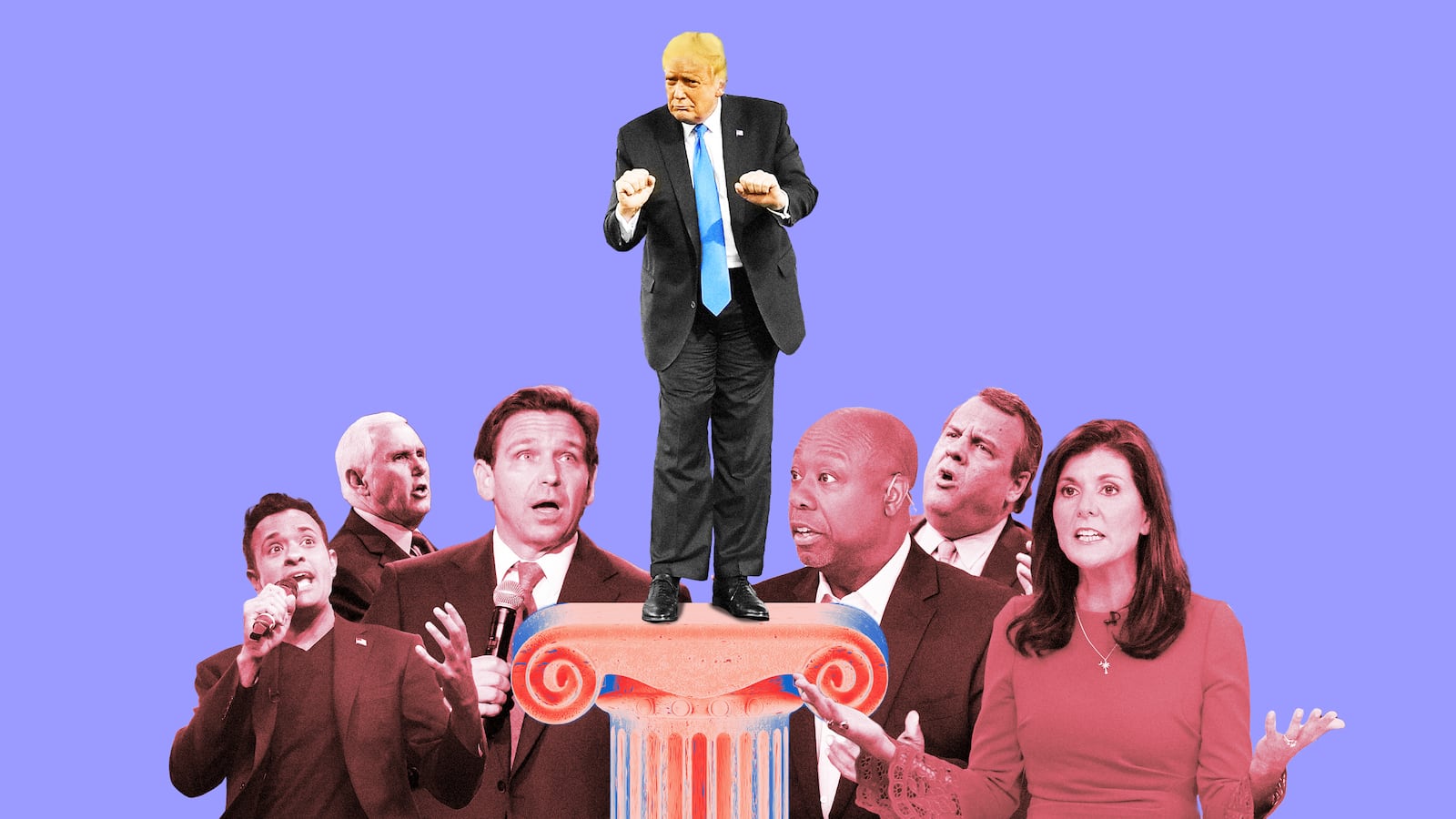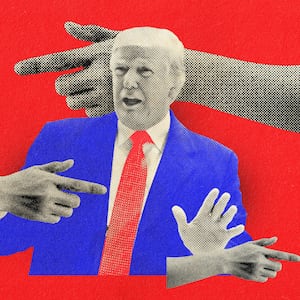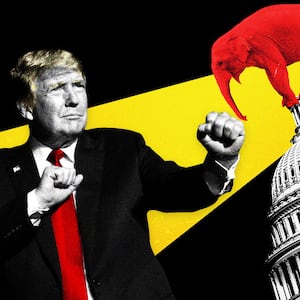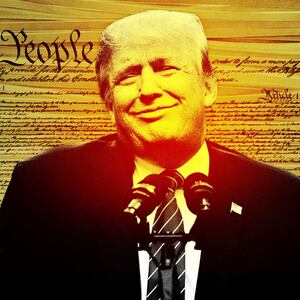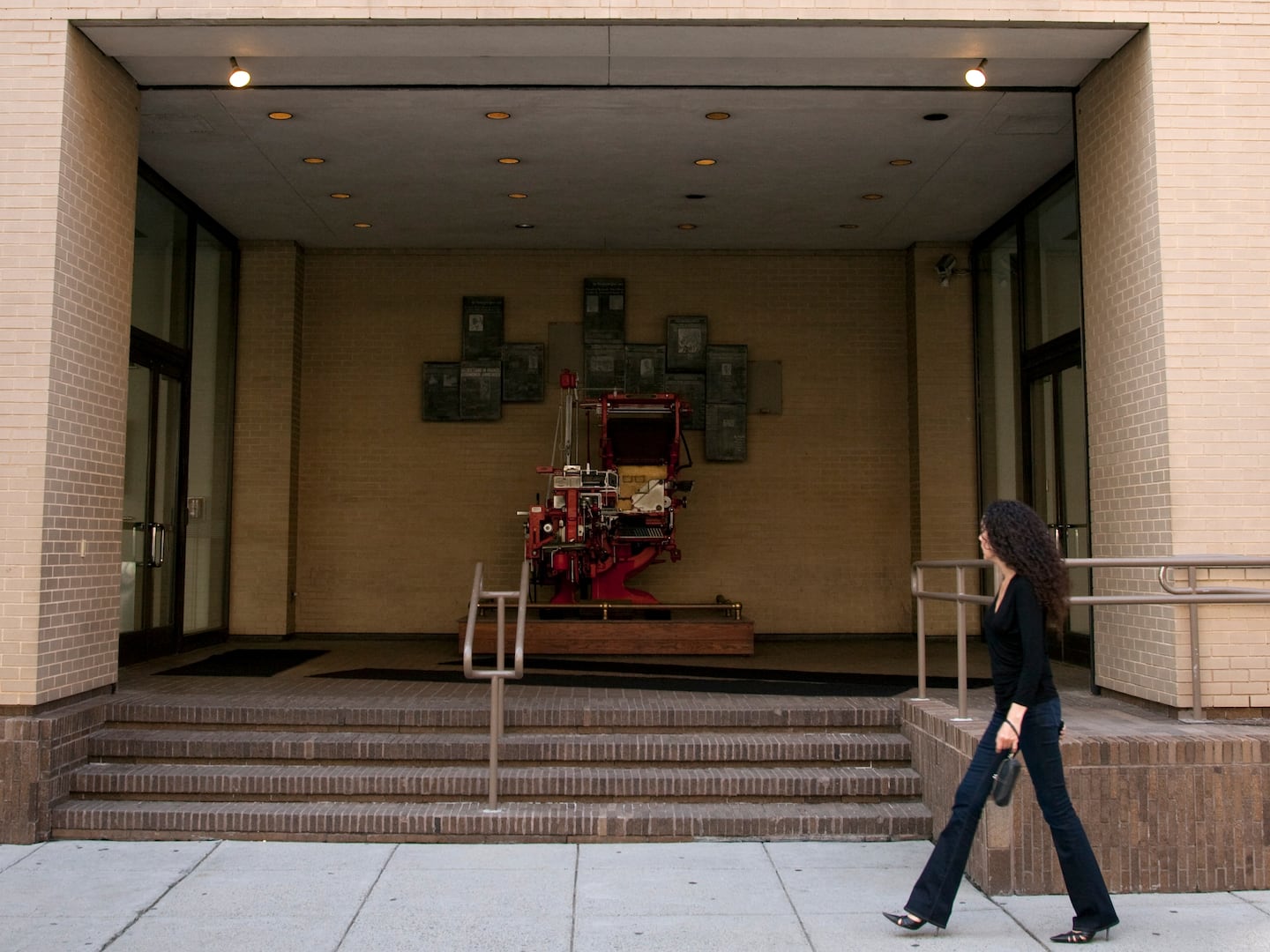Appearing in the Republican presidential primary debates is no small feat. After skipping the events in the 2020 cycle to give then-President Donald Trump a default coronation, the GOP has erected around the 2024 debate stage the big, beautiful wall it can’t quite build on the southern border.
Some of the party’s requirements clearly function to establish viability. For instance, candidates must register support of at least 1 percent in select national and early primary state polls, and they must count at least 40,000 unique campaign donors in at least 20 U.S. states and territories.
But other rules are less about interest among the voting public and more about partisan discipline: Candidates will be barred from the stage unless they sign two pledges, one to support whomever the GOP eventually nominates for president, and the other to refuse to participate in any general election debate organized by the Commission for Presidential Debates (a bipartisan organization, cofounded by the Republican Party itself, which has overseen such debates since 1987 and already gives the GOP more control over the debates than it had in earlier decades).
These demands—as well as the party’s indication that it may select smaller, more right-wing outlets like Newsmax to host, rather than major networks like NBC—may seem like they create a level playing field for candidates. After all, they’ll all face the same moderators, whichever outlets host. And they’ll all have to meet the same numeric baselines and sign the same pledges.
But in practice, across the board, these conditions will be uniquely favorable for one contender: Trump.
His advantage in polling and donors is obvious. With two previous wins of the Republican nomination and four years in the White House, Trump has a preexisting national campaign apparatus and a voter base none of his challengers can match.
Trump may not technically have met these qualifications for the debate stage yet, because the GOP is only looking at polls from July 1 onward, but there’s no question about the outcome here.
The same cannot be said of many other contenders, including several serious candidates. Florida Gov. Ron DeSantis, former U.S. Ambassador to the United Nations Nikki Haley, entrepreneur Vivek Ramaswamy, and Sen. Tim Scott (R-SC) have all reported they’ve scaled these two barriers. But former New Jersey Gov. Chris Christie and former Vice President Mike Pence might not have the requisite donor base, and former Arkansas Gov. Asa Hutchinson may not post adequate polling support.
That lack of a national base makes the possible choice of smaller media hosts (as well as the rule about skipping the general election debates if the CPD organizes them) a more difficult condition for non-Trump candidates, too. Trump will be just fine if the primary debates have low viewership, or if the general race has no debates at all.
His challengers, DeSantis perhaps excepted, need that national attention. They need the Twitter clips and soundbites and the opportunity, however small, for a breakthrough moment—but their party doesn’t seem inclined to grant it.
Finally, with the loyalty pledge, Trump has an unmatched advantage of a different sort: Even by politician standards, he is extremely comfortable with lies.
He’s made some noises about refusing to commit to party loyalty, as he did for a while in 2016, when the pledge wasn’t a debate-stage prerequisite. If Trump holds firm in his refusal, my suspicion is Republican leadership will back off the demand, because debate viewership will tank if Trump’s not involved.
But if the GOP insists, as Republican National Committee Chair Ronna McDaniel recently said on Fox News, that “the pledge is staying and anybody who wants to seek the nomination of our party should pledge to support the voters,” my guess is Trump will sign it, then simply go back on his word if he’s not the nominee.
And that’s just a normal day for Donald J. Trump. I’m not even sure he’d register breaking his pledge as an act of bad faith. This is a man, after all, who believes his net worth is determined by his feelings, a man who seems to live in a perpetual now, utterly unencumbered by past promises or future aspirations. He’ll sign what he needs to sign and break what he wants to break.
Some of Trump’s rivals, like Haley, have already committed to signing as part of the “battle to save our country” from President Joe Biden. For others, however, it’s not so simple. Some seem to have actual moral qualms about making a pledge they don’t wholly intend to keep.
Former Rep. Will Hurd (R-TX)—who probably wouldn’t have cleared the polling barrier anyway—has said he just can’t do it. “I can’t lie to get access to a microphone,” Hurd told CNN. “I’m not going to support Donald Trump. I recognize the impact that it has on my ability to get access to the debate stage, but I can’t lie.”
The Hutchinson campaign has asked that the pledge be modified. DeSantis, Pence, and Ramaswamy have yet to commit. And Christie, who has vehemently attacked Trump as unfit for the presidency, has said he’ll sign the pledge to get to the stage while all but acknowledging it’d be a lie.
Christie’s route, which I suspect other candidates will eventually join, may be the grossest course of all, the most glaring indication of how completely Trump’s ethos has overtaken his party.
“Whoever knows what is right to do and fails to do it, for him it is sin”—or, you know, just what it takes to lead the GOP.

